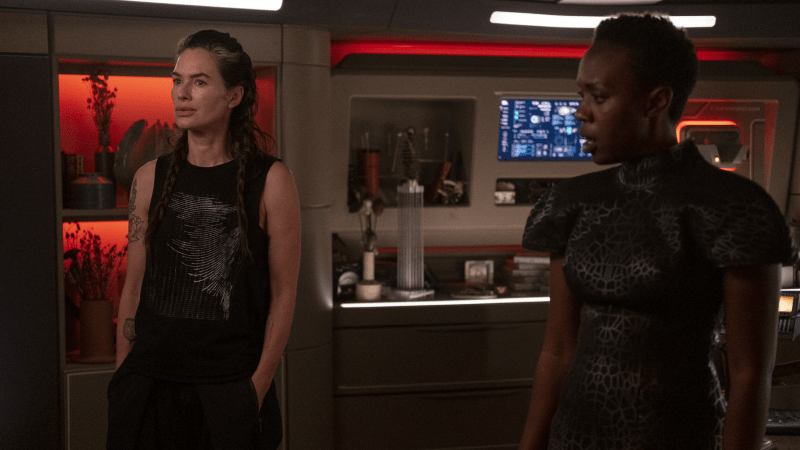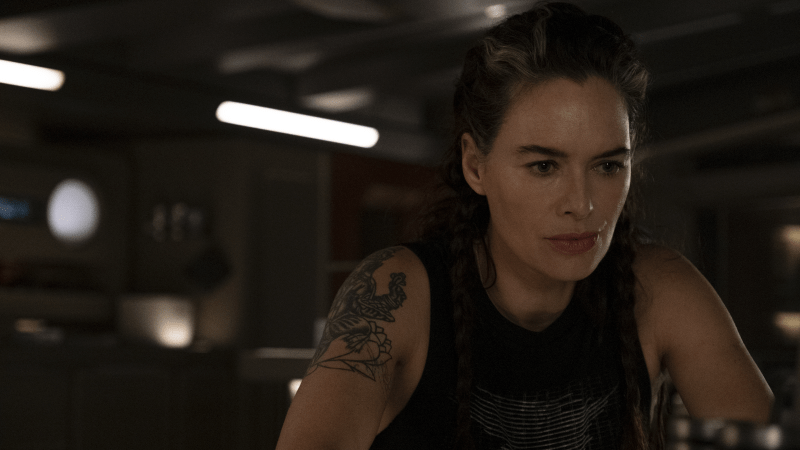This review contains very mild spoilers for Beacon 23.
Watching Beacon 23 made me think that maybe it’s actually okay if some projects don’t have queer people in them.
On paper, this show has all the ingredients to make me love it. First and foremost, it stars Lena Headey. Honestly that’s all I knew about it before going in and it was enough for me to give it a shot. I love Lena Headey. Second, Lena Headey plays a bisexual badass. Third, it is based on source material written by the same author who provided the source material for Silo, an Apple TV+ show that I enjoyed very much. And fourth, it’s on MGM+, the same network that brought us FROM, one of my favorite sci-fi shows of the year.
Alas, despite having all the right ingredients, Beacon 23 did not end up appetizing.
The titular Beacon 23 is a sort of lighthouse, floating in the far reaches of space, scanning for dark matter, and telling passing spaceships whether or not the passage is safe. The show is, ultimately, more about Beacon 23, and its AI Bartholomew, than it is about any human character. To its credit, the show does a great job of impressing upon its audience the stifling nature of living in Beacon 23. Each episode feeling like a bottle episode; some episodes feeling like a home invasion movie. The show imagines a future where humanity has expanded across the universe, colonizing many planets in many solar systems throughout the galaxy, but we never see these other planets and colonies.
We never leave the Beacon.
The show takes its time, unraveling the present and past of the Beacon, while also unveiling a mystery that connects it all. And when I say unveiling I do mean just unveiling, not explaining. The audience is as in the dark as the characters, if not more so, about this mystery Some parts of it felt a little like reading the book Annihilation, purposefully vague, purposefully without explanation or clarity, occasionally to the point of being disorienting.
And yes, Lena Headey’s character, Aster, is queer.

We briefly encounter someone Aster is sort of dating, Coley, played by Sandrine Holt. Their relationship is contentious and volatile and considering Coley is only in the one episode, and Aster’s queerness has no more bearing on her character or the story at all, I’m not sure it was worth it. I am a strong believer that a person’s queerness does not have to be inherently tied to a relationship, so it’s not that I wish Coley had stayed longer (though I do). It’s just that the queerness felt more like someone deciding they needed a character to be queer and picking Aster and Coley at random, instead of considering the implications, based on the dialogue and plot lines planned for these two characters. It’s sort of nice, in theory, to be included at all, and wardrobe definitely got the memo. But if Coley hadn’t been in that one episode, we never would have known Aster was queer, and I think that’s a miss.
I loved Aster. She’s snarky as hell and has so much charm and swagger! I could spend the rest of my life watching Lena Headey play queer. But, at the end of the day, I’m not sure we can add this one to the “win” column. I have more egregious reasons, including more than one bad queer trope playing out, but they’re extremely spoilery, so I’ll have to bite my tongue for now.
There were things I did like about Beacon 23, though. For example, the casting; Lena Headey is brilliant, of course, with Natasha Mumba acting up a storm at her side. Plus, Barbara Hershey features heavily, and glamorously, in an episode. They also did a great job world-building; they managed to express the vastness of space in the confines of one building. Without too much exposition, but also without being too confusing, they clue the audience in on different companies, factions, and communities. I also was a big fan of the wardrobe. Even in the first two episodes, I suspected Aster was queer because of her whole look. And finally, I really enjoyed the Beacon’s AI Bartholomew. He was very funny, and I’m always impressed when sci-fi shows can make a spaceship sentient enough to invest you in them as a character even though they’ve never had human form. All told though, it wasn’t enough to balance the aforementioned bad tropes, nor the slow and confusing pace.

If you don’t have expectations for positive representation, and just want to hear Lena Headey joking about passing time in quarantine “wanking,” and see Lena Headey’s hair in braids and Lena Headey’s arms in a tank top, maybe you’ll enjoy Beacon 23 more than I did. But if you want to watch Lena Headey as a queer character worth celebrating, maybe just watch Imagine Me & You again instead.
The first two episodes of Beacon 23 are now streaming on MGM+.







Comments
I’m sorry but all I read was ‘Lena Headey Queer’, I’m sold, I didn’t even know something called MGM+ existed but I’m getting it now.
L Word Alumna Sandrine Holt in a pop-in guest appearance? WAY TO BURY THE LEDE, VALERIE.
haha that is a fair accusation lolol
I feel like Sandrine Holt makes a habit of randomly joining (sci-fi and other) shows to clearly queerify main characters.Sanctuary and Helen Magnus come to mind.
Hugh Howey really goes “will anyone write more books about how humanity would survive trapped in some form of metal container?” and not wait for an answer. (I really enjoyed Wool! Haven’t watched the adaption yet though.)
Even with all these points, you also included those Lena Headey screenshots…so I’ll at least give this one a look.
”She’s snarky as hell and has so much charm and swagger!” – sure, but this has no bearing to her sexual orientation (and you brought up her queerness in the next sentence as if it’s related but literally anyone can be snarky, come on). Also, wearing a top tank, braids and sport trousers does not necessarily mean someone is queer lmao. How else can the character that spends a big part of her life in space journeys and suspension dress? I’m sorry but that’s a bit shallow and stereotypical.
The funniest part about this is just a couple episodes in I knew the author was a mid 20s-30s basic insecure white guy with a lesbian fetish whose ego is threatened by what he desires. The first warning was the overly predictable annoying adolescent who was just too angsty with an oedipus complex. Like Salvador Dali he was terrified of us his mothers overbearing and like Oedipus killed one parent (his mother, an act of dominating the parent they fear) and relentlessly sought to win the love of the hyper masculine toxic father. It’s overdone, but almost all of his character development was to the point I was predicting the next turn of events nearly without fail. All you had to do was think like a really, really basic white dude who mildly copyrights other authors and is informed by bias, and you know what will happen. Now I don’t understand this because Silo is a sci-fi work of art, though at times also annoyingly predictable with many stolen elements of sci-fi.
The minute Sandrine randomly stepped on the ship I was delighted to see a queer character and knew within minutes they were going to wack her. It’s the most overdone trope in Western cinema. He fetishes the lesbians. It’s hot, the character even walks in and sees them making out and he is teased by it. But the male and female are having chemistry you see they’re overtly massaging each other and subtly flirting while saying one too many times there’s nothing going on, but the big bad lesbian just keeps getting in the way. She’s insufferable and angry and hates men, because the men who write like this must convince the audience to justify their slaughter. But the tiny male ego wants to fetishize and watch, just like a homophobe may watch on his computer, but in the end he needs his fragile ego to win.
Next they all write the same storyline once they’ve gotten off on a sex scene or make out or two they murder the les or throw her in jail or a righteous “man savior” converts or marries her. But most often they’re fragile and they have wack them off. There’s actually a book about this and it applies to wild women too not just lesbians…the powerful unbridled woman is fetishized by the man and ultimately he forces her to become tame and submit, like a manhandled horse, through death or marriage or conversion. You can see this in the end of Penny Dreadful when her God fearing white savior boyfriend saves her from herself once they’re thoroughly used her, because she’s too powerful and lost to handle herse, in Jean Grey the Phoenix from XMen, when her power is too great to handle and Wolverine kills her to save the world, in Daenerys Targaryen who inexplicably goes mad with no context whatsoever just in time for her white savior John Snow to take her out of existence “for her own good.” The audacity these uncreative authors all have in common is they even write the women as grateful to their tiny little savior man, because they themselves couldn’t handle their own power like a man could. In a way it’s not far from an oedipus complex in itself, fetishize one and wack the other. Look carefully. It’s always the same type of men authoring these stories. And it’s boring.
Anyway as a boring man would write it, the angry les tried to kill the guy and suprise suprise his little hand massage was so powerful Lena chose her man crush savior over her longtime girlfriend.
And not just “chose,” she violently and methodically kills her for him. The script tells you this is to save his life but that’s bogus. She could have printed a knock out patch or sedative or threw her in stasis or sent her ship somewhere or tied her up. But the fragile male ego needs her out of the way. He needs to be chosen, the assault welcomed. He must be able to conquer and convert anyone, and his final boss is the lesbian.
Anyway we really get into the authors mommy issues in the next episode. If you don’t want to waste hours of time exploring the broken vacuous black hole of a middle aged basic white man who hasn’t started therapy yet, I’d find a sci fi author who can think creatively and not from trite templates of the insecure man. They’re are powerful brave secure male authors out there who can appreciate female power without needing to subdue it.
Sounds like they should have followed the book plot and left out the lesbianism in the first place. Two souls finding peace with each other after some conflict. Done..and a better result.